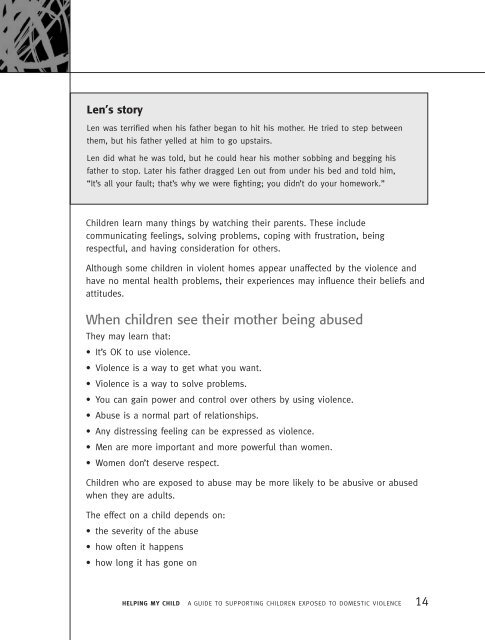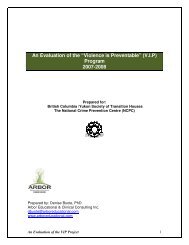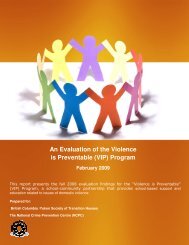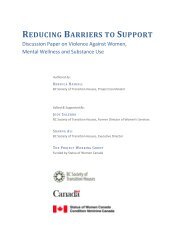a guide to supporting children exposed to domestic violence
a guide to supporting children exposed to domestic violence
a guide to supporting children exposed to domestic violence
You also want an ePaper? Increase the reach of your titles
YUMPU automatically turns print PDFs into web optimized ePapers that Google loves.
Len’s s<strong>to</strong>ry<br />
Len was terrified when his father began <strong>to</strong> hit his mother. He tried <strong>to</strong> step between<br />
them, but his father yelled at him <strong>to</strong> go upstairs.<br />
Len did what he was <strong>to</strong>ld, but he could hear his mother sobbing and begging his<br />
father <strong>to</strong> s<strong>to</strong>p. Later his father dragged Len out from under his bed and <strong>to</strong>ld him,<br />
“It’s all your fault; that’s why we were fighting; you didn’t do your homework.”<br />
Children learn many things by watching their parents. These include<br />
communicating feelings, solving problems, coping with frustration, being<br />
respectful, and having consideration for others.<br />
Although some <strong>children</strong> in violent homes appear unaffected by the <strong>violence</strong> and<br />
have no mental health problems, their experiences may influence their beliefs and<br />
attitudes.<br />
When <strong>children</strong> see their mother being abused<br />
They may learn that:<br />
• It’s OK <strong>to</strong> use <strong>violence</strong>.<br />
• Violence is a way <strong>to</strong> get what you want.<br />
• Violence is a way <strong>to</strong> solve problems.<br />
• You can gain power and control over others by using <strong>violence</strong>.<br />
• Abuse is a normal part of relationships.<br />
• Any distressing feeling can be expressed as <strong>violence</strong>.<br />
• Men are more important and more powerful than women.<br />
• Women don’t deserve respect.<br />
Children who are <strong>exposed</strong> <strong>to</strong> abuse may be more likely <strong>to</strong> be abusive or abused<br />
when they are adults.<br />
The effect on a child depends on:<br />
• the severity of the abuse<br />
• how often it happens<br />
• how long it has gone on<br />
HELPING MY CHILD A GUIDE TO SUPPORTING CHILDREN EXPOSED TO DOMESTIC VIOLENCE 14






